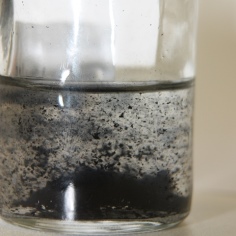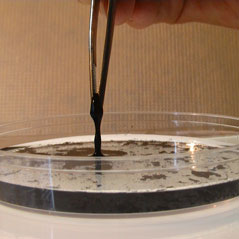Microbiology of underground storage of hydrogen
In underground storage microorganisms can cause severe damage to the goods and industrial equipment contained therein. Despite the relevance of the impending use of underground storage of hydrogen there are still no systematic investigations on the microbial processes in these reservoirs. This stands in strict contrast to the development potential of microorganisms in hydrogen-underground storage.
To study the risks, the damage potential for technical installations and microbiological processes in the underground storage of hydrogen, a research project is currently underway. The objective is to characterize the potential metabolic processes and microorganisms involved. In practical laboratory tests microbiological scenarios are modeled to analyze key parameters influencing the theoretical processes and provide criteria for reservoir selection and risk assessment. The required inspections are based on extensive experience with microbially induced damage in underground gas storage and utilization of geothermal energy and serve as a precursor to object-specific application studies.
Studies and Research Projects
Influence of Bio-methane and Hydrogen on the Microbiology of Undergound Gas Storage (Literature Study)
This literature review addresses possible impacts and risks of microbiological processes in underground gas storages, with regard to a partial feed-in of hydrogen and bio-methane. The multiple microbial metabolic pathways are presented, practical aspects of ecological parameters of reservoir microbiology, interactions with the rock matrix and formation waters, contamination risks and possible technical consequences for storage management are discussed.
Based on published data, microbiological risks associated with a partial feed-in of hydrogen and bio-methane into gas pipeline system can be estimated to a certain extent. Since hydrogen is an energy source for many anaerobic metabolic processes, a substantial risk potential for underground gas storages, especially porous reservoirs exists. Numerous underground storages in Germany provide all necessary conditions for a rapid and complete microbial degradation process of the injected hydrogen content. Therefore, an uncritical concentration limit for hydrogen proportion cannot be specified.
Rapid hydrogen consumption by methanogenic and sulfatereducing prokaryotes can cause considerable technical and economic consequences, such as formation of hydrogen sulfide (H2S), microbial induced corrosion (MIC) or reduction of formation permeability. The extent of possible negative effects and whether specific low-risk reservoirs exist, are currently subject to speculation.
Development of a strategy for safety monitoring and treatment of microbiological processes in underground storage of hydrogen from renewable sources (Research project)
Supported by the state of Saxony-Anhalt, evaluation criteria for a safe underground storage of hydrogen from renewable sources were analyzed as part of a 3-year research program. A method for safety monitoring of underground storage facilities has been developed. This catalog includes all the necessary analyses and methods for practically relevant microbiological evaluation of underground storages. Furthermore, strategies for effective treatment of operational disruptions caused by microorganisms were identified.
To evaluate the analytical methods a culture collection of microorganisms from German underground storages has been created, which are able to grow under different conditions. By using these cultures, the influence of microorganisms on hydrogen storage under different ecological conditions of caverns and porous storages was investigated and necessary accompanying analyses were defined. As a result of these model experiments, the major risk parameters of hydrogen storage in underground facilities were determined.
Possible strategies for the prevention and treatment of microbial populations in underground storages have been tested and evaluated under practical conditions in high-pressure experiments. The developed safety monitoring program was transferred into the service portfolio of MicroPro GmbH.


